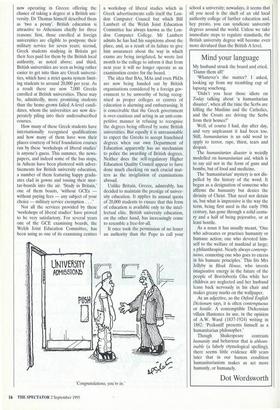Mind your language
My husband struck the board and cried, 'Damn them all!'
'Whatever's the matter? I asked, looking up from my trembling cup of lapsang souchong.
'Didn't you hear those idiots on Today talking about 'a humanitarian disaster', when all the time the Serbs are killing the Muslims and the Catholics, and the Croats are driving the Serbs from their homes?'
Well, of course I had, day after day, and very unpleasant it had been too. Still, humanitarian is an odd word to apply to terror, rape, thirst, tears and despair.
The humanitarian disaster is weirdly modelled on humanitarian aid, which is to say aid not in the form of guns and bombs, but of food and medicine.
The 'humanitarian' mystery is not dis- pelled by the history of the word. It began as a designation of someone who affirms the humanity but denies the divinity of Christ. That need not detain us, but what is impressive is the way the term, being first used in the early 19th century, has gone through a solid centu- ry and a half of being pejorative, or at least hostile.
As a noun it has usually meant, 'One who advocates or practises humanity or humane action; one who devoted him- self to the welfare of mankind at large; a philanthropist. Nearly always contemp- tuous, connoting one who goes to excess in his humane principles.' This fits Mrs Jellyby in Bleak House, who invests imaginative energy in the future of the people of Borrioboola Gha while her children are neglected and her husband leans back nervously in his chair and makes greasy marks on the wallpaper.
As an adjective, so the Oxford English Dictionary says, it is often contemptuous or hostile. A contemptible Dickensian villain illustrates its use, in the opinion of A.W. Ward (1837-1924) writing in 1882: 'Pecksniff presents himself as a humanitarian philosopher.'
Though Shakespeare contrasts humanity and behaviour that is abhom- inable (a falsely etymological spelling), there seems little evidence 400 years later that in our human condition humanitarianism makes us act more humanly, or humanely.
Dot Wordsworth


















































 Previous page
Previous page